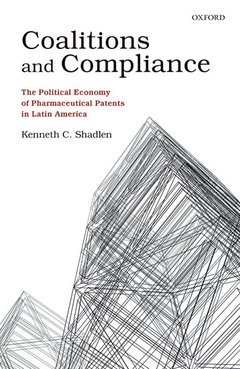Description
Coalitions and Compliance
The Political Economy of Pharmaceutical Patents in Latin America
Author: Shadlen Kenneth C.
Language: English
Subjects for Coalitions and Compliance:
Publication date: 08-2017
312 p. · 16.2x24.2 cm · Hardback
312 p. · 16.2x24.2 cm · Hardback
Description
/li>Biography
/li>
Coalitions and Compliance examines how international changes can reconfigure domestic politics. Since the late 1980s, developing countries have been subject to intense pressures regarding intellectual property rights. These pressures have been exceptionally controversial in the area of pharmaceuticals. Historically, fearing the economic and social costs of providing private property rights over knowledge, developing countries did not allow drugs to be patented. Now they must do so, an obligation with significant implications for industrial development and public health. This book analyses different forms of compliance with this new imperative in Latin America, comparing the politics of pharmaceutical patenting in Argentina, Brazil, and Mexico. Coalitions and Compliance focuses on two periods of patent politics: initial conflicts over how to introduce drug patents, and then subsequent conflicts over how these new patent systems function. In contrast to explanations of national policy choice based on external pressures, domestic institutions, or Presidents' ideological orientations, this book attributes cross-national and longitudinal variation to the ways that changing social structures constrain or enable political leaders' strategies to construct and sustain supportive coalitions. The analysis begins with assessment of the relative resources and capabilities of the transnational and national pharmaceutical sectors, and these rival actors' efforts to attract allies. Emphasis is placed on two ways that social structures are transformed so as to affect coalition-building possibilities: how exporters fearing the loss of preferential market access may be converted into allies of transnational drug firms, and differential patterns of adjustment among state and societal actors that are inspired by the introduction of new policies. It is within the changing structural conditions produced by these two processes that political leaders build coalitions in support of different forms of compliance.
Ken Shadlen is Professor of Development Studies in the Department of International Development, the London School of Economics and Political Science (LSE). His previous books include Democratization Without Representation (Penn State University, 2004), The Political Economy of Hemispheric Integration (co-edited with Diego Sanchez-Ancochea; Palgrave, 2008), The Politics of Intellectual Property (co-edited with Sebastian Haunss; Edward Elgar, 2009), and Intellectual Property, Pharmaceuticals and Public Health (co-edited with Samira Guennif, Alenka Guzmán, and Narayanan Lalitha; Edward Elgar 2011).
© 2024 LAVOISIER S.A.S.




